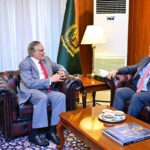UNITED NATIONS, Feb 02 (APP):Pakistan has called for continued “engagement” with the Taliban government in a bid to develop guidelines on human rights, especially women’s rights, in Afghanistan that will conform more closely to the international community’s wishes, saying the old approach of using financial pressure to achieve the objective is not working.
“Pakistan and the Islamic countries in the region are working towards that objective of promoting women’s rights,” Ambassador Munir Akram said after a briefing given to member states on the recent high-level visits to Afghanistan by two separate delegations, one led by UN Emergency Relief Coordinator, Martin Griffiths and the other by UN Deputy Secretary-General Amina Mohammed.
Griffiths told the meeting they told the Taliban authorities that a December 24 edict barring women from working for national and international NGOs (non-governmental organizations) was doing no favours for the people of Afghanistan, and called for its revocation. Women are an essential, central component of the humanitarian operation in Afghanistan, he stressed. At the same time, Griffiths said he had received “exceptions” in the health and education sectors, which have enabled activities to restart.
In his remarks, Ambassador Akram said, “We (Pakistan and Islamic countries in the region) have continued engagement despite our disagreements with the positions of the Taliban,” he said, adding, “We have tried persuasion.”
Ulema delegations have repeatedly been sent to Afghanistan to try and convince them that their practice is not consistent with Islam, he said.
The Pakistani envoy said that Foreign Minister Bilawal Bhutto Zardari will convene a conference in New York on March 8 on Women in Islam. The move, he added, was “another way of conveying a message of what are the standards and freedoms and rights that women enjoy under Islam and Islamic sharia and this is a strategy of persuasion which we will continue.”
He said that the Taliban’s restrictions flow — not so much from a religious perspective — as from a peculiar distinctive cultural reality of Afghanistan, which requires women to be kept at home and had not changed for hundreds of years.
“So to expect a complete transformation overnight on the condition that aid will stop to the Afghan people if they do not adhere to international standards, is a rather optimistic expectation.”
The new UN strategy to engage with the Taliban, he said, had brought about some results in terms of the “exemptions”, which have been made, promising some space for women, adding, “we must work to broaden that space”.
Ambassador Akram also hoped that the donor community will not walk away from Afghanistan, and that the UN Secretary-General’s appeal for $4.4 billion appeal, which is so far, only half funded, will be fully funded going forward, leading to the revival of the country’s economy.






